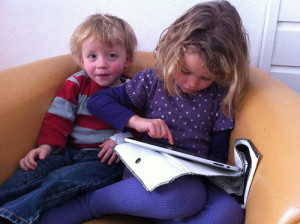Reading both to and with your child is one of the greatest opportunities for teaching and nurturing that a parent encounters. Not only are you helping her to learn the skill of reading, you’re also providing her with with knowledge, skills, and questions about the world that will serve her throughout her life. There is extensive research indicating that parental reading to preschoolers leads directly to language growth, emergent literacy, and future reading achievements. There is also substantial research indicating that struggling readers, who may have learning or attentional difficulties, benefit the most from repeated exposure to reading at home and school.
These studies do not address the importance of reading with your child as an opportunity for nurturance and closeness, but I can attest to my own sense of satisfaction while reading together with my kids. I fondly recall cuddling with each of my three sons (now in their late teens and twenties) while reading with them when they were toddlers and pre-readers. As they began to develop their reading skills, they would proudly want to read a book with me. As they got older, we would often read together before going to sleep at night. They would take a seat beside me on their bed or stretch out from opposite ends of the couch and we would each read silently and independently, a shared opportunity for togetherness in a favorite activity.
When my children were learning to read, there were not many other options for reading beyond the traditional bound book. Sure, there were books on cassettes, and in fact, I can remember my son Seth, hooked up to a “Walkman” at the age of 2 ½ , being able to “read” the book “Patrick’s Dinosaur” that he had listened to 25 times or more while on a car trip.
Today, however, there are many new electronic means for reading, which may be particularly useful for children with dyslexia or learning and attentional difficulties. In no way do I wish to discourage you from traditional forms of reading a paper-bound book with your child. However, if your child is a struggling reader, she will undoubtedly benefit from increased amounts of practice and exposure to words and reading. For many children, the electronic screen is enough to get them to practice a bit more. For others, the interactivity and portability may be helpful. Struggling readers may also like the opportunities for private practice (where nobody can witness their mistakes) and immediate feedback that is available on some of the touch screen books that will pronounce words on command.
A few strategies for “reading together” in today’s digital world:
- Listen to audio books in the car. Find a set of books that are age-appropriate and of interest to your child. Rather than listening to the radio or everybody listening to their own iPod, listen to the audio book on longer drives. This provides a chance for listening to highly fluent and expressive readers. Take occasional breaks in listening to the book to check for comprehension by asking your child questions about the content. In addition, try to recall new vocabulary words and check if your child understood the meaning of these words.
- Play Words With Friends or other mobile word games with your children. If your child has a smart phone or iPod touch, you can play a number of word games that will help them to improve their vocabulary and their spelling.
- Read an interactive book together. There are an increasing number of interactive books for cell phones and tablets that allow you to read together, tap the book to learn the spelling of objects on the page, or allow your child to read and to tap a word that they do not know how to pronounce. These interactive books also allow for a great deal of exploration and are particularly useful for children with a short attention span for sitting or reading.
- Make television watching more productive by turning off the sound. One way to read together is to use the closed captioning option on your television and turn off the sound. You can choose to alternate reading new words with your child or have them read on their own. This is best done on a show that they like. Cartoons, sitcoms, and kind-friendly stations may be best.
- Use a Karaoke machine for reading. Encourage them to listen to their favorite music and to try and remember the words. Then have some family time where you sing together, while reading the words as they come up onto the screen. Initially, this works well when your child has fully memorized their favorite songs, but as you progress, you might want to have them try songs that they have less familiarity with, so they have to focus a bit more on reading the words on the screen.





